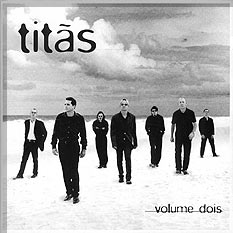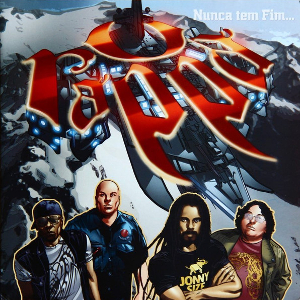
The bass guitar, electric bass or simply bass is the lowest-pitched member of the guitar family. It is a plucked string instrument similar in appearance and construction to an electric or acoustic guitar, but with a longer neck and scale length. The bass guitar most commonly has four strings, though five- and six-stringed models are also relatively popular, and bass guitars with even more strings or courses have been built. Since the mid-1950s, the bass guitar has largely come to replace the double bass in popular music due to its lighter weight, the inclusion of frets in most models, and, most importantly, its design for electric amplification. This is also due to the fact that the double bass is acoustically compromised for its range in that it's scaled down from the optimal size that would be appropriate for those low notes.

The acoustic bass guitar is a bass instrument with a hollow wooden body similar to, though usually larger than, a steel-string acoustic guitar. Like the traditional electric bass guitar and the double bass, the acoustic bass guitar commonly has four strings, which are normally tuned E-A-D-G, an octave below the lowest four strings of the 6-string guitar.

Tagima is a Brazilian guitar manufacturing company based in São Bernardo do Campo, São Paulo. The name Tagima comes from Seizi Tagima, a Japanese descendant who learned to craft guitars just by watching the process.

Whatever We Wanna is the eighth studio album by American singer LeAnn Rimes, released June 6, 2006. The album has a more rock-oriented sound. The album was released and promoted exclusively in Europe, Taiwan, and Brazil. It was originally slated to be released in the U.S., however, the release was pulled due to the success of her single, "Something's Gotta Give", leading to an increase in sales of This Woman. A deluxe edition with three bonus remixes was released in the US on September 10, 2021, fifteen years after the original release.

Volume Dois is the ninth studio album released by the Brazilian rock band Titãs. Following the success of the previous album, Acústico MTV, Volume Dois features unplugged arrangements of previously recorded Titãs' songs, along with some new ones. Once again, an orchestra was called to record the album. It is one of their most successful albums, having sold more than 1 million copies as of 2015.

A Melhor Banda de Todos os Tempos da Última Semana is the eleventh studio album released by Brazilian rock band Titãs. It is the first album composed entirely of new material since 1995's Domingo; the first released via Abril Music following the end of the partnership they had with WEA since the band's debut; the first without founding member and guitarist Marcelo Fromer, who died just before the recording sessions ; the last featuring founding member, vocalist and bassist Nando Reis, who would leave the band after the album's release to focus on his solo career, and the last produced by Jack Endino.

Como Estão Vocês? is the twelfth studio album released by Brazilian rock band Titãs. It was the first album by the band without vocalist/bassist Nando Reis and also the first without any contribution by guitarist Marcelo Fromer. Fromer died after being hit by a motorcycle on 11 June 2001, but his ideas were still used for their then upcoming album A Melhor Banda de Todos os Tempos da Última Semana which would be recorded a few days later. Reis left the group in 2002 stating he wasn't prepared to record another album due to still being shaken by the deaths of both Fromer and his friend Cássia Eller. It is also their first release via BMG, following Abril Music's bankrupt.

Filmworks VII: Cynical Hysterie Hour is a 1989 album by John Zorn featuring music written for a series of Japanese animated shorts that were created by Kiriko Kubo. It features Zorn's first music for cartoons and was originally released on the Japanese Sony label in limited numbers. In late 1996 Zorn finally attained the rights for his music and remastered and re-released the album on his own label, Tzadik, in 1997.

Cidades e Lendas is the thirteenth solo album by Brazilian musician Zé Ramalho. It was released in 1996, after another four-year gap with no albums. It was released in a show at TUCA, São Paulo, around the time when his hit "Admirável Gado Novo" was featured at the soundtrack of Rede Globo's telenovela O Rei do Gado. When comparing this work with his previous effort, Frevoador, Ramalho said he was more satisfied this time because he had more time "to choose the best repertoire and invite the right people".

Sacos Plásticos(Plastic Bags) is the thirteenth studio album released by Brazilian rock band Titãs. It is their first studio album since 2003, their longest non-album gap, and also the first released through Arsenal Music and with producer Rick Bonadio, who had already worked with Fresno, Charlie Brown Jr. and NX Zero. The album has significant influence from electronic elements.
Mallavoodoo is a Brazilian instrumental music group formed by Thales Silveira (bass), Alexandre Bicudo (guitar), Mário Lobo and Misael Barros (drums).

Arthur Maia is the second solo album recorded by Brazilian bassist Arthur Maia. The album is also known as Sonora.
Ebel Perrelli is a Brazilian composer and musician. He has worked with Lenine, Naná Vasconcelos, Chuck Silverman, Manu Katché, and Jonathan Mover. He was a member of Mallavoodoo, BPM Trio, and Mandinga.

Randy in Brasil is the twelfth solo album by jazz trumpeter Randy Brecker. It was produced and arranged by Ruriá Duprat in November 2006 but not released until September 2008 by Mama Records. The album won the 2009 Grammy Award for Best Contemporary Jazz Album.

I Love Brazil! is a 1977 studio album by Sarah Vaughan, accompanied by prominent Brazilian musicians Milton Nascimento, Dori Caymmi, and Antônio Carlos Jobim.

Nunca Tem Fim... is the ninth and final studio album by Brazilian band O Rappa. It was released August 15, 2013 in Brasil and distributed through Warner Music. Produced by Tom Saboia and mastered by Stephen Marcussen in California.

Déjà-Vu is the third and currently last studio album by Brazilian band Metrô, released in 2002 by independent label Trama. Their first album of new material in 15 years after they first broke up, it reunited them with former vocalist Virginie Boutaud, who had been fired from the band in 1986. Original guitarist Alec Haiat decided not to partake in the band's reunion though due to his involvement with other projects at the time and other personal reasons, and so was replaced by André Fonseca. Xavier Leblanc, who was also very busy with his then-newly founded French bistro, La Tartine, only acted as a session member on the tracks "Achei Bonito" and "Johnny Love", being subsequently replaced by Pedro Albuquerque until the band separated again in 2004.

Os Cascavelletes were a Brazilian rock group from Porto Alegre, Rio Grande do Sul. One of the first rock bands from Rio Grande do Sul to acquire mainstream success nationwide alongside its "sister project" TNT, they were characterized by their irreverent style inspired by 1950s-era rockabilly culture and acts such as The Rolling Stones and The Beatles, and by their comical, profanity- and sex-laden lyrics. Some of their most famous compositions are "Sob um Céu de Blues", "Menstruada", "Estou Amando uma Mulher", "Eu Quis Comer Você" and the 1989 hit "Nêga Bombom".

Vórtex Demo is the first demo tape released by Brazilian rock band Os Cascavelletes in 1987. It would attain them a massive reputation in the underground Rio Grande do Sul rock scene, and highly sexually explicit tracks such as "Estupro com Carinho", "Banana Split", "A Última Virgem" and "Morte por Tesão" became staples of their self-proclaimed style, "porno rock".

Alexandre Silveira de Oliveira is a former police chief, businessman and Brazilian politician, affiliated with the Social Democratic Party (PSD). He was a senator for Minas Gerais.


















